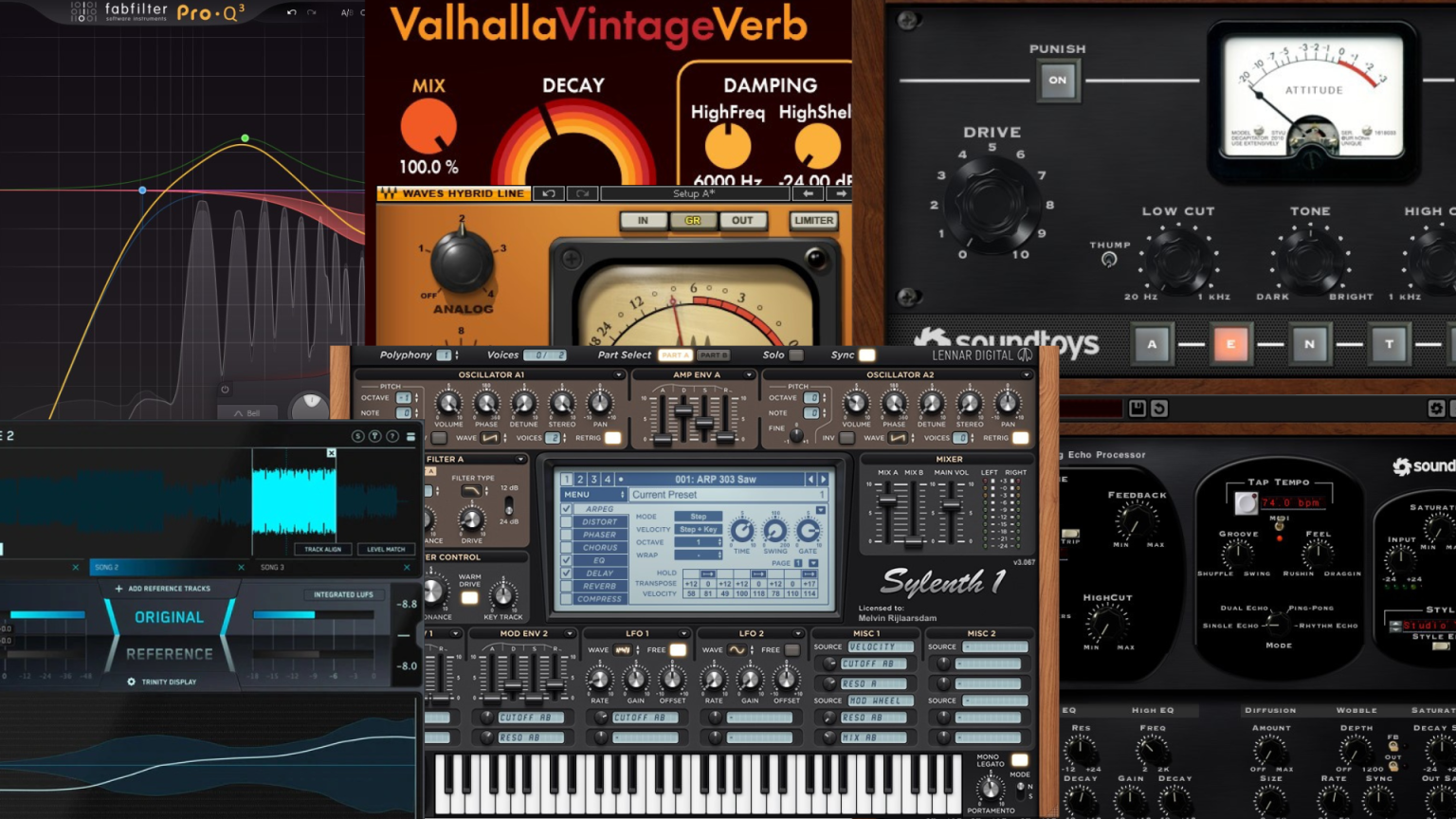Plugins for music producers can enhance the quality and creativity of their work. These plugins provide a range of tools and effects to manipulate audio, improve mixing and mastering, and add unique textures and sounds to productions.
As a music producer, the right plugins can make all the difference in taking your tracks to the next level. From EQs and compressors to reverbs and delays, there are countless options available to suit your specific needs and preferences.
Some popular plugins for music production include Serum, Kontakt, Omnisphere, and Waves. The key is to find a balance between selecting plugins that fit your workflow and style, while also experimenting with new ones to push your creativity. With the right plugins, music producers can achieve the professional sound and unique flair that sets their work apart.
Types Of Plugins
Music producers can benefit from various types of plugins, such as virtual instruments, effects, and mixing tools. These plugins can enhance the sound quality, creativity, and efficiency in music production.
Types of Plugins: Plugins are essential tools that multiplies the power of digital audio workstations (DAWs) and allows producers to create outstanding soundtracks. Typically, plugins are categorized into three main types: Virtual Instruments, Effects Plugins, and Utility Plugins. Virtual Instruments: Virtual Instruments are standalone software instruments that mimic real instruments. These plugins give producers access to an array of electronic and acoustic instrumental simulations. It’s possible to play a virtual instrument through a MIDI controller or keyboard attached to a computer. The following are examples of Virtual Instruments plugins: – Grand Piano: provides a range of piano sounds such as a grand, upright, or electric piano. – Omnisphere: a popular and versatile plugin that delivers exceptional sound design and synthesis capabilities. – Kontakt: a sampler designed with the flexibility of composing grand orchestras works, choir pieces, or EDM bangers in mind. Effects Plugins: Effects Plugins purpose is to shape and modify existing audio signals. Producers use these plugins to add spread, echo, or distortion, depending on the required effect. Effects plugins provide the producer with the possibility to hyper-customize their sounds. The following are examples of Effects Plugins: – Reverb: adds reverberation to the sound, defining the space and distance that the listener perceives it. – Delay: adds a delayed echo to the sound that provides a sense of space to the listener. – Distortion: adds harmonic excitement to the sound and can make it more aggressive or distorted if required. Utility Plugins: Utility Plugins are designed to help producers carry out different tasks and streamline workflows. They usually center around metering, tuning, and alignment for final outputs. Here are some examples of Utility Plugins: – EQ (Equalization): balances the frequencies on an individual track or a mix to ensure that they complement each other. – Compressor: reduces the dynamic range of a track and provides greater control over the loudness of a mix. – Mastering Plugins: these are plugins that are used to finalize the mix and add the final polish. Conclusion: The different types of plugins available to music producers provide a wide range of tools and possibilities for creating music. Whether it’s Virtual Instruments, Effects or Utility Plugins, these tools assist and guide producers to create unique and distinctive sounds. As a music lover, understanding the different categories of plugins available will go a long way in helping you to create better soundscapes.

Credit: www.optoproductions.com
Top Plugins For Music Producers
Discover the top plugins for music producers to take your productions to another level. These exceptional plugins include VSTs, synths, virtual instruments, and more. Enhance your music production and unleash your creativity with these versatile plugins.
Plugins are an essential part of music production and can make a huge difference in the quality of sound. In today’s world, there are many plugins for music producers to choose from, making it overwhelming to pick the right one. We have compiled a list of the best plugins for music producers, from Native Instruments Komplete, Waves Audio Plugins, Izotope Plugins, Spectrasonics Omnisphere to FabFilter Plugins.
Native Instruments Komplete
Native Instruments Komplete is one of the most popular plugins among music producers. With over 65,000 sounds and more than 600GB of samples, it is a comprehensive package of high-quality sounds, synths, and instruments. It also includes popular software like Kontakt, Reaktor, and Guitar Rig, which can be used to create music across different genres. You can use sounds from Komplete in any digital audio workstation (DAW) like Ableton, Logic, or FL Studio.
Waves Audio Plugins
Waves Audio Plugins is another well-known plugin for music producers. The Waves Gold Bundle includes 42 plugins, and you can choose to buy individual plugins to suit your needs. Waves is acclaimed for its mastering plugins like the L3-LL Multimaximizer and the SSL G-Master Buss Compressor. Waves Audio Plugins is a bit on the expensive side, but the quality of sound makes it worth the investment.
Izotope Plugins
Izotope Plugins is one of the most popular plugins for mixing and mastering. Their Neutron 3 Advanced plugin is a go-to tool for music producers, providing a one-stop-shop for all your mixing needs. It analyzes your audio and offers suggestions for EQ, compression, and other settings. Izotope Plugins include popular software like RX 8, which is a must-have for audio restoration projects.
Spectrasonics Omnisphere
Spectrasonics Omnisphere is a virtual instrument plugin that’s widely used in music production. With over 14,000 sounds, it is a powerful tool for creating music across different genres. It includes sounds ranging from traditional instruments like pianos to electronic sounds like synths and pads. Omnisphere is known for its unique sounds and the ability to manipulate them.
Fabfilter Plugins
FabFilter Plugins is a collection of plugins for mixing and mastering. Their Pro-Q 3 equalizer plugin is one of the best in the market, providing a clear and precise sound. Their Pro-MB multiband compressor and the Pro-L 2 limiter are also popular among music producers. FabFilter Plugins are easy to use and provide a professional level of sound quality. In conclusion, Native Instruments Komplete, Waves Audio Plugins, Izotope Plugins, Spectrasonics Omnisphere, and FabFilter Plugins are top plugins for music producers. With these plugins in hand, music production becomes easier, faster, and more fun. They are essential tools in a music producer’s arsenal, regardless of the music genre.
How To Choose Plugins
When choosing plugins for music production, it’s important to consider their compatibility with your DAW, their quality, and their functionality. Take the time to research and read reviews from trusted sources before making a purchase, and consider whether each plugin is necessary for your specific needs and workflow.
When it comes to producing music, plugins are essential tools that can enhance workflow, creativity, and the overall quality of your music. With the plethora of plugins available in the market, selecting the best plugins that cater to your workflow can be daunting. It is imperative to understand what to look for in a plugin before making a purchase. This section will illustrate the critical factors to consider when choosing plugins.
Compatibility
The primary factor to consider when choosing plugins is compatibility. Compatibility issues can occur if your Digital Audio Workstation (DAW) and operating system (OS) are not compatible with a plugin. It is crucial to verify if a plugin is compatible with your DAW and OS before making a purchase. Most plugin developers provide compatibility information on their websites, making it easy for you to make an informed decision. You can also seek recommendations from your peers or consult with experts to ensure that you buy a plugin that works seamlessly with your DAW and OS.
Functionality
The functionality of a plugin is another critical factor to consider. It is essential to understand what a plugin does and how it does it. A plugin can either be a virtual instrument or effect. Virtual instruments generate sounds that create melodies, beats, or chords, while effects modify the sound of a recording. Understanding the type of plugins that best suit your workflow can help you narrow down your options. You can also consider the number of features a plugin offers and how they can aid your music production process.
Pricing
Pricing is a crucial factor to consider when choosing plugins. The cost of a plugin can vary, depending on several factors such as the features, reputation of the developer, and the market demand. It is essential to set a budget and identify plugins that fall within your budget. However, it is crucial to note that cheap plugins may compromise quality or functionality. Conversely, an expensive plugin does not always guarantee quality or functionality. You can also research alternative plugins that offer similar features at a fraction of the cost. In conclusion, choosing plugins is a crucial step in music production. Understanding compatibility, functionality, and pricing can help you make informed decisions that cater to your workflow and budget. By applying the factors discussed in this section, you can save time, money, and enhance the overall quality of your music production.

Credit: plus.pointblankmusicschool.com

Credit: thebasementxxx.com
Frequently Asked Questions Of Plugins For Music Producers
What Are The Best Plugins For Music Production?
The best plugins for music production are subjective and depend on personal preference. However, some popular choices include Native Instruments Komplete 13, Waves SSL E-Channel, Valhalla VintageVerb, and FabFilter Pro-Q 3.
What Are Plugins Used For In Music Production?
Plugins are software programs that are used in music production to enhance the creative process and functionality of digital audio workstations. These can be used for tasks such as adding effects, virtual instruments, equalization and compression to audio tracks.
Do Producers Use Plugins?
Yes, producers use plugins extensively in their production work. Plugins enhance the sound quality, provide creative effects and add depth to the tracks. These plugins help in achieving desired sound quality and make the track stand out. From EQs to reverb, compression to distortion, producers use plugins for a variety of purposes.
What Plugins Do Artists Use?
Artists commonly use plugins for graphic design, photo editing, and digital painting. Popular options include Adobe Photoshop, Illustrator, Lightroom, and Procreate. Additionally, some artists use plugins for 3D modeling, animation, and video editing, such as Blender and Final Cut Pro.
Conclusion
Plugins are a must-have for music producers who wish to take their craft to the next level. Using a combination of the right plugins can enhance the quality, efficiency, and creativity of your music production process. With thousands of plugins available on the market, selecting the right ones can be a daunting task.
However, armed with the knowledge provided by this blog post, you can now make informed decisions that will help you create better music. Try out new plugins and experiment with different combinations to unlock your full potential as a music producer.